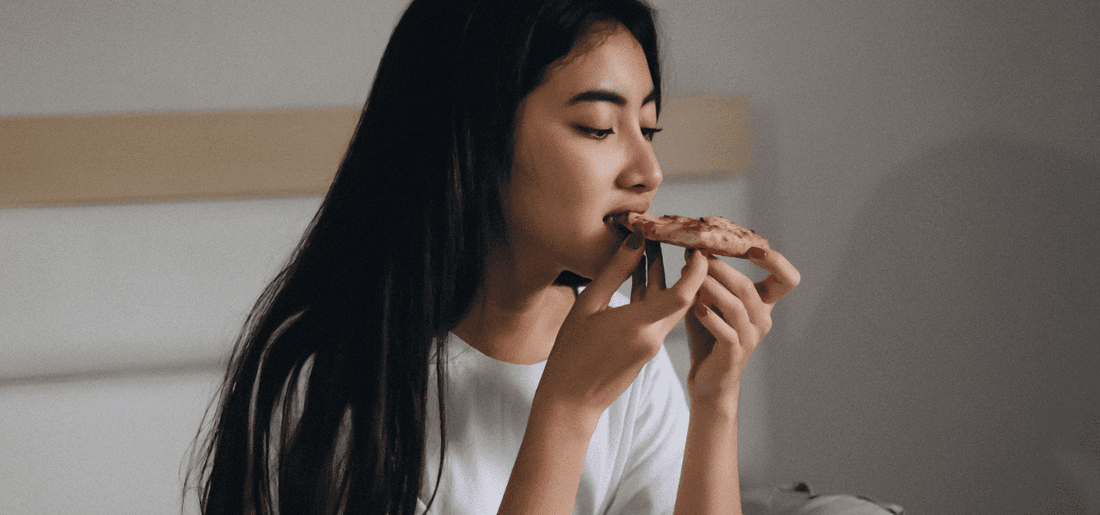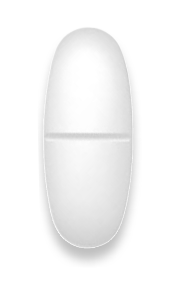How long before going to sleep should you not eat?

It's clear that eating close to bedtime can affect sleep. Most of us have experienced poor sleep after a meal that lasts longer than we're used to, because we toss and turn due to indigestion and feel uncomfortably full.
Recently, however, the question of how much time should elapse between sleeping and eating has been brought back into focus. There are many studies linking nighttime eating to weight gain 1 , with evidence supporting a link between the two, as well as a link between nighttime eating and inadequate sleep 2 .
This can sometimes lead to the conclusion that eating before bed is always bad, or that the time you eat has such a strong physiological effect that it makes other factors such as total calorie intake, stress, or lack of sleep seem unimportant.
However, correlation and causality can be misleading on this issue. So in this article, we will examine:
- The link between nighttime eating and poor sleep
- The evidence for the link between nighttime eating and weight gain
- How to interpret this evidence
- The important connections between sleep, nutrition and stress
- Why most of us shouldn’t focus on when we eat
It is true that when you stop eating before bed is related to sleep and the potential to lose or gain weight, but not in the way we might think.
Nighttime eating and sleep quality
Heartburn (acid reflux) is a common condition affecting 20% of the United States population 3 . If you suffer from heartburn, you should allow at least three hours between eating and going to bed. Studies 4 have shown that shorter times between dinner and bedtime are significantly correlated with more severe symptoms, which have been shown to impact sleep quality 5 .
A three-hour interval between eating and going to bed is also often recommended for the general population 6 ,7 , 8 . However, the recommendation here is much less clearly defined and based on less conclusive evidence.
For example, a comprehensive article in the British Journal of Nutrition 9 showed that eating or drinking less than an hour before bedtime was associated with increased sleep duration and WASO (wakefulness after sleep onset) , which could be interpreted as the eating itself causing disrupted sleep. (The article clarifies that in this case, longer sleep duration is not necessarily a good thing: "Indeed, longer self-reported sleep duration might indicate efforts to compensate after experiencing greater sleep difficulties, such as unsuccessful sleep initiation or maintenance. The association we found between eating before bedtime and a higher likelihood of WASO supports this interpretation").
However, these and similar studies do not establish a causal link between the two phenomena. For example, people who regularly eat late at night may also have poor sleep hygiene for other reasons - for example, due to stress 10 or a regularly disrupted daily routine.
While the results do not suggest that eating late leads to poor sleep, they add to the picture that routine and habits in general can be important for sleep. Further research into why the time between dinner and bedtime correlates with sleep quality will likely yield useful results.
Nighttime eating and weight gain
The link between nighttime eating and weight gain is clear: numerous studies 11 , 12 , 13 have shown that people who eat before bedtime are more likely to gain weight and that eating late at night affects body mass index (BMI) 14 .
But again, the evidence on this topic does not support a causal relationship, and in fact there is no known physiological basis for weight gain as a result of eating close to sleep. Although it is commonly believed that a slower metabolism might lead to greater fat storage (since fewer calories are burned for energy), the nighttime basal metabolic rate is in fact very similar to that during the day 15 . During sleep, many things are going on that require energy, so energy expenditure is not significantly reduced.
In this case, it's easy to think of other factors that affect how we interpret this information. Nighttime snacking adds extra calories to your daily food intake, and if you do it constantly, it will obviously lead to weight gain. In addition, there is another disruptive factor that is very closely related to sleep: stress.
Sleep, eating habits and stress
Rather than eating before bed being the cause of poor sleep, the reality may be just the opposite. Lack of sleep has been linked to weight gain and nighttime eating 16 , with weight gain clearly due to consuming extra calories. Lack of sleep has also been linked to an increase in ghrelin 17 , the "hunger hormone," which leads to overeating and calorie excess.
In addition, stress affects ghrelin levels 18 and is naturally related to sleep 19 , 20 . Individuals who eat later may feel the effects of poor sleep and stress-related sleep problems, leading to increased "reward-oriented eating"—what is commonly referred to as "comfort eating." Mindfulness practice has been shown to not only improve sleep disorders such as insomnia 21 but also decrease reward-dependent eating 22 , suggesting that some of the things we can do to improve sleep could also improve eating habits, and vice versa.
Sleep and nutrition as part of general well-being
There is no simple answer to the question of when to stop eating before bed. While there is some evidence of a link between sleep and eating habits, there is no well-understood mechanism as to why one might affect the other.
For most people, a snack close to bedtime won't hurt. But one important takeaway is how much sleep and diet affect overall well-being. Rather than thinking about specific parts of our daily routine and biological processes, it may be more effective to think about how we take care of ourselves - how we manage stress, how we think about our diet and sleep. While it would be nice if not eating before 8 p.m. was the cure for insomnia and weight gain, it's clear that there's usually something more fundamental to do if we want to improve our health and well-being.
Prioritize good sleep hygiene
If you're wondering whether your eating habits are affecting your sleep, it's best to think about sleep hygiene in general before getting too caught up in the specifics of evening meal times.
For the basic principles of good sleep hygiene, see our article here on managing environmental factors and developing a healthy sleep routine . In this article, you'll also find additional information on how wake-up aids like B・SYNC ON can improve your daily mood and energy levels in the same way that good sleep hygiene does, by helping you feel better when you wake up and reset your internal clock, rather than tackling sleep problems directly.
Because sleep is so fundamental to our health and well-being, it makes sense to prioritize it if you're concerned about how your daily habits affect your well-being.
If you are using B・SYNC ON to support your natural sleep and wake cycle, remember not to eat anything in the two hours before bedtime, as this can cause B・SYNC ON to be released too quickly in your body and wake you up before you have had a full night's rest. We always advise B・SYNC ON users to ensure that their last meal or snack is at least two hours before going to bed and taking the supplement.
Sources
- https://pubmed.ncbi.nlm.nih.gov/25439026/
- https://www.cambridge.org/core/journals/british-journal-of-nutrition/article/associations-between-bedtime-eating-or-drinking-sleep-duration-and-wake-after-sleep-onset- findings-from-the-american-time-use-survey/72A5D22C25A35FA975A5B50991431E0C
- https://www.ncbi.nlm.nih.gov/books/NBK441938/
- https://pubmed.ncbi.nlm.nih.gov/16393212/
- https://www.ncbi.nlm.nih.gov/pmc/articles/PMC2879818/
- https://www.leesa.com/article/eating-before-bed-pros-and-cons
- https://pharmeasy.in/blog/how-long-should-you-wait-before-going-to-bed-after-dinner/
- https://health.clevelandclinic.org/is-eating-before-bed-bad-for-you/#:~:text=It's%20best%20to%20stop%20eating,go%20to%20bed%20feeling%20hungry.
- https://www.cambridge.org/core/journals/british-journal-of-nutrition/article/associations-between-bedtime-eating-or-drinking-sleep-duration-and-wake-after-sleep-onset- findings-from-the-american-time-use-survey/72A5D22C25A35FA975A5B50991431E0C
- https://www.sciencedirect.com/science/article/abs/pii/S1389945712000470
- https://pubmed.ncbi.nlm.nih.gov/25439026/
- https://pubmed.ncbi.nlm.nih.gov/23036285/
- https://pubmed.ncbi.nlm.nih.gov/23814334/
- https://pubmed.ncbi.nlm.nih.gov/21527892/
- https://pubmed.ncbi.nlm.nih.gov/18234245/
- https://pubmed.ncbi.nlm.nih.gov/23814334/
- https://www.ncbi.nlm.nih.gov/pmc/articles/PMC4688118/
- https://www.ncbi.nlm.nih.gov/pmc/articles/PMC5373497/
- https://www.sleepfoundation.org/insomnia/stress-and-insomnia
- https://pubmed.ncbi.nlm.nih.gov/34922108/
- https://www.health.harvard.edu/blog/mindfulness-meditation-helps-fight-insomnia-improves-sleep-201502187726
- https://www.ncbi.nlm.nih.gov/pmc/articles/PMC4799744/









